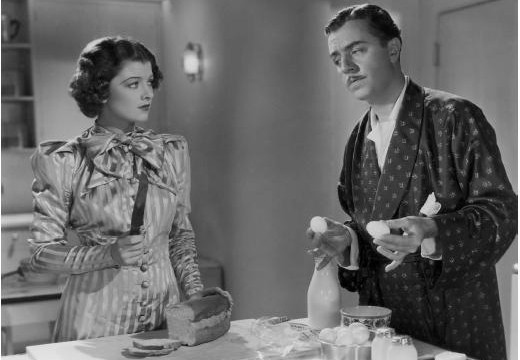We didn’t have a lot of spare cash when I was a kid, but my mom deliberately made sure that we had a few small luxuries. One of them was a pretty decent-sized video library. Mom being Mom, though, they weren’t just Disney movies and Don Bluth movies, as was true for so many of my friends. I mean, we owned those, too, but Mom also bought movies she wanted to watch herself, which is one of the ways I became a film buff. It took her most of a year, but Mom eventually acquired the entire series of Thin Man movies.
The first one had been nominated for four Oscars, losing all of them to It Happened One Night. (My belief that the wrong film swept the Oscars that year is the subject of another conversation.) Given Hollywood, there was no way it wouldn’t get a sequel or two—or five. If the first one isn’t known well enough these days, the sequels are only more obscure than that.
Nick and Nora Charles (William Powell and Myrna Loy in their sixth movie together), having solved the Thin Man case back in New York, return to their home in San Francisco to spend New Year’s alone. Their plans are first thwarted by the surprise party they’re apparently throwing themselves in their house; I’m not sure we ever find out whose idea it was, and Nick and Nora are footing the bill. Then, they are summoned by Nora’s Aunt Katherine (Jessie Ralph). Nora’s Cousin Selma (Elissa Landi) is married to a cad, Robert Landis (Alan Marshal), who has gone missing. The family has agreed to hold their collective nose and let Nicholas find Robert.
It turns out that Robert is seeing a nightclub singer, Polly Byrnes (Penny Singleton, still going by Dorothy McNulty at the time). She, however, is involved with Dancer (Joseph Calleia), who is using her to extort money from David Graham (James Stewart), long in love with Selma, for making Robert divorce Selma. He has handed over a stack of negotiable bonds. Robert goes to pack a suitcase and says goodbye to Selma. She follows him, gun in hand, to convince him to stay. In the fog, as the clock strikes midnight, Robert is shot and killed.
As always, large amounts of the comedy in the movie comes from the contrast between Nora’s socialite upbringing and Nick’s low-class connections. A couple of movies on, we’d find out that Nick is in fact the son of a doctor from a small town, but that doesn’t really matter. What’s more important is that, when he met Nora, he was a professional detective, and he still has many, many underworld contacts. Indeed, one of Nora’s early lines in the film is “Oh, you wouldn’t know them, dear; they’re respectable.”
For all that, though, Nick’s associates are more vital than Nora’s family. They’re thugs and purse-snatchers and so forth, but they certainly aren’t stuffy. Nick is expected to do the “after-dinner port” thing with the men, he’s the only one who stays awake. Aunt Katherine consistently calls Nick “Nicholas” and Lieutenant Abrams (Sam Leven) everything but his name—a name, of course, that hints that the detective just might be Jewish. No wonder Nora seems to get off on Nick’s detective work; it’s got to be more interesting than sitting around the drawing room with her relatives.
There’s also more than a hint that Selma’s neuroses come from being overbred and too sheltered for her own good. I think it’s implied that, if nothing else, the criminals with whom Nick associates are closer to their feelings, which is healthier. Not for them repression and secret gunfire in alleys; if they need to shoot you, they’re like as not to shoot you in the chest.
Most of the time, I love Nick and Nora as a couple. Oh, they drink too much; they drink more than frankly should be possible. They’re a loving couple. They may sleep in double beds, as is expected under the Code, but it doesn’t exactly take the eventual advent of Little Nicky to tell us that they share a bed now and again. He jokes a lot about having married her for her money, but these days, you figure he’d also mention something about how good she is in the sack.
That said, it has always rather bothered me how frequently he treats Nora like a child. In this one, Nick and Abrams are on their way out to follow up on a clue that someone threw through Nick and Nora’s kitchen window the night before, and Nora is eager to go along with them. Nick locks her in her closet to keep her there. In The Thin Man Goes Home, my favourite of the series, Nick actually spanks her. I get that this was the ’30s and ’40s, but still. It isn’t anymore, and the scenes tend to bother me. Nora’s a pretty savvy dame when the stories let her be, and when she isn’t, it seems to be because we need to prove that Nick’s smarter.
This is another “squeaking past the Code” film. Selma’s marriage is falling apart because her husband is cheating on her—with a woman who has her own boyfriend, not to mention a husband. There are, after all, all those criminals, none of whom are necessarily reformed. The purse-snatcher says he is, but only after he’s stolen Nora’s purse. Nick does not turn him in. Really, the whole series dances around the Code, and it’s only a mercy that they didn’t have to figure out how to fit the things into Prohibition, which ended the year before the first one came out.
This movie also features, in my opinion, one of the finest performances of James Stewart’s career. Of course, getting into how would detail the ending, and we can’t have that, can we?

